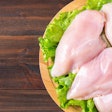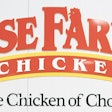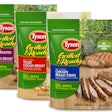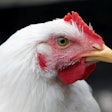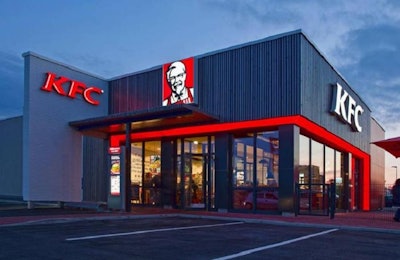
KFC has taken a further step towards what it deems higher standards of broiler welfare by signing up to the European Chicken Commitment in six European countries, and global food service firm Compass Group has recently made the same undertaking for its businesses.
Under the European Chicken Commitment — known as the Better Chicken Commitment in the U.K. — KFC will source all of its fresh, frozen and processed chicken in the U.K., Irish Republic, Germany, The Netherlands, Belgium, and Sweden from farms applying higher welfare standards by 2026.
The global fast food chain is the first in its sector to join the commitment, reports Verdict Food Service, and the move will improve the lives of 72 million chickens each year.
KFC UK and Ireland general manager Paula MacKenzie said that joining the commitment is “the right thing to do,” and that other firms should sign up.
“Chicken is our business and we have a responsibility as the chicken brand, to make sure we’re pushing improvement to chicken welfare standards across our supply chain,” she said. “That’s why we’re adding our voice to the campaign and encouraging others to do the same because to inspire real change and provoke meaningful action, we need the industry to move with us.”
Leading global food service company Compass Group has also signed the European Chicken Commitment recently.
Federico Tonetti, Compass Group Safety and Sustainability Director, said that farm animal welfare in the supply chain is a key element of the firm’s sustainability strategy.
“As a founding member of the Global Coalition for Animal Welfare (GCAW), a global platform launched in October 2018 that unites seven major food businesses and animal welfare experts in advancing animal welfare globally, we identified improved broiler chicken welfare as a key priority for our business,” he said. “Underpinning this commitment is the need for our farmers, processors and supply chain partners to mobilize as one with the wider industry, to drive these welfare improvements forward, and we look forward to working with them.”
According to the Better Chicken web site, other companies that have joined the Commitment are Danone, Elior, Marks & Spencer, Monoprix, Nestlé, Sodexo, Unilever, and Waitrose.
In June of 2018, Nestlé undertook to adopt the European Chicken Commitment standards by 2026 for its food brands Herta, Buitoni, Wagner, and Maggi. Taking a phased approach, the firm’s chilled meat brand Herta was scheduled to be sourcing its chickens under the program from the start of 2019 for the Herta “Preference” brand in France.
European Chicken Commitment standards
Originally signed by almost 30 animal welfare organizations from across the continent, the European Chicken Commitment set out the following standards to address what the group identified as the most pressing concerns in broiler production.
- Comply with all EU animal welfare laws and regulations, regardless of the country of production.
- Implement a maximum stocking density of 30kg per square meter or less. Thinning is discouraged and if practiced must be limited to one thin per flock.
- Adopt breeds that demonstrate higher welfare outcomes: either the following breeds, Hubbard JA757, 787, 957, or 987, Rambler Ranger, Ranger Classic, and Ranger Gold, or others that meet the criteria of the Royal Society for the Prevention of Cruelty to Animals (RSPCA) Broiler Breed Welfare Assessment Protocol.
- Meet improved environmental standards including:
- At least 50 lux of light, including natural light.
- At least 2 meters of usable perch space, and two pecking substrates, per 1,000 birds.
- On air quality, the maximum requirements of Annex 2.3 of the EU broiler directive, regardless of stocking density.
- No cages or multi-tier systems.
- Adopt controlled atmospheric stunning using inert gas or multi-phase systems, or effective electrical stunning without live inversion.
- Demonstrate compliance with the above standards via third-party auditing and annual public reporting on progress towards this commitment.
Signatories said they would require their suppliers to meet these minimum requirements for all of the chicken in their respective supply chains by 2026.









